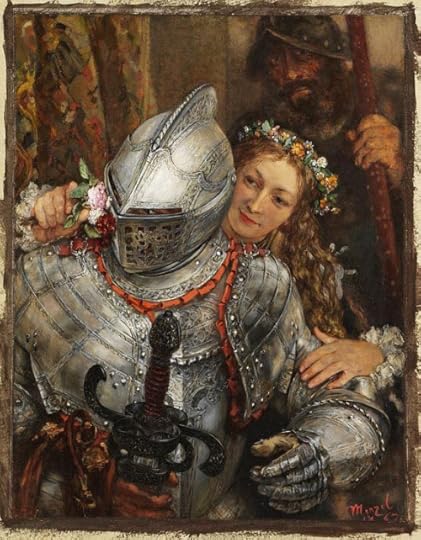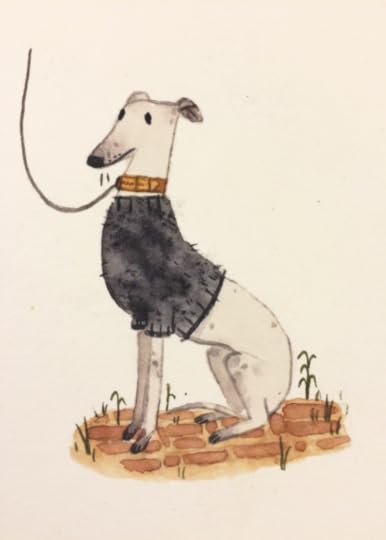Maggie Stiefvater's Blog: Maggie Stiefvater, page 367
May 12, 2016
anachronisticfairytales:
Adolf von Menzel
karicasady:
I met a greyhound named Hemingway recently. Did you...
I wish I could to reply individually to all the thank you notes...

I wish I could to reply individually to all the thank you notes for the Raven King, but it’s physically impossible, particularly while I’m on tour. All I can say is thank you for sending them and let you know that I do try my best to read as many as I can (usually in big clumps while sitting in airports or standing in line for food).
May 11, 2016
Why I Fuck Up My Cars
Maggie Stiefvater Tickets, Wed, May 25, 2016 at 7:00 PM | Eventbrite
Massachusetts readers, the tickets for the Plainville event just became available — if you’re thinking of going, snatch one fast as the Brookline event filled up in 10 minutes.
Why I Fuck Up My Cars
I wrote this thing for @jalopnik.
maggie-stiefvater:
the raven king countdown → day...





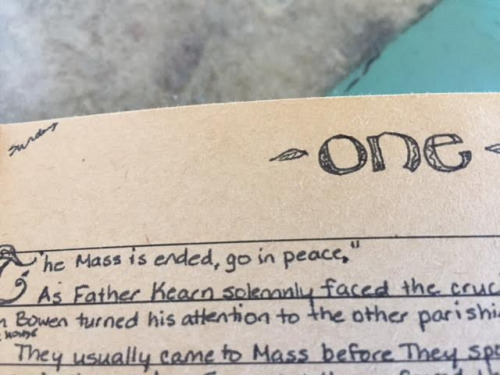

the raven king countdown → day eight
Favorite quote
what am I
I can’t tell you what my favorite quote is, because it’s the last line of the series.
The Raven King is my thirteenth published novel, and you’d think — I thought, anyway — that novel-writing would get easier with practice. But in reality, it feels like a magic trick. Every time.
It’s not that I don’t know now if I can finish a novel. That knowledge, grounded in repeated success, at least conveys from project-to-project. The rub is this: I am absolutely certain that I can get to an end of a book. I’m just never sure if I’m going to get to the end.
Why are you writing this story?
I have to know the answer to this question before I begin drafting. It’s my mission statement. My endpoint. It’s how I know I’m done: I’ve written the book I intended to write. It means I often have to write several other books that are not the real thing on the way to it. And it’s getting harder, not easier, now that I know more about building stories. Before, I would get stuck when my subconscious stabbed the brakes. I’d be forced to circle back and ask myself why I couldn’t move forward — oh, because you’re telling the wrong story, Stiefvater.
But now! Nice try, writer’s block. I can strong-arm a set of characters through a properly structured set of tasks to create a beginning, middle, and end.
Just not the one I intended to.
It’s a tough problem, because only I can diagnose it. I can send a draft to my critique partners and editors and they can sign off on it, but only I can decide if the novel I sent them was the one I set out to create. It becomes even more complex when looking at a project like the Raven Cycle — four novels written over nearly a decade, a series begun when I was a teenager. Back then, the story asked a question that I didn’t have an answer for. That was the why.
what am I tell me what I am
Which brings me to the last line of the Raven Cycle. From my fraught inbox, I know readers are looking forward to very different things in the conclusion of the series. They have dozens of different priorities for what constitutes a happy or satisfying or logical conclusion to the series, depending on what they believe the story is about, depending on what their priorities are for a good story. But for me, the why are you writing this story has always had a pretty simple answer, focused around that question that teenage me had no answer for.
When I wrote the last line in the Raven Cycle, I knew I’d written the story I had intended to. I’d pulled off the magic trick again — whether it’s a trick that anyone else finds diverting is another thing. I wish I could hand a copy to teen-me.
“Read this, you asshole,” I’d tell her, “it says everything you need to hear.”
She wouldn’t have believed me — I wasn’t big on believing in people back then — but she would’ve come around, I think.

Good job, kiddo. We did it. Fist bump.
maggie-stiefvater:
the raven king countdown → day five
OTPWhat...
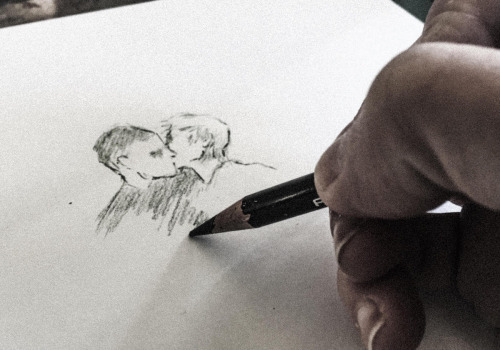
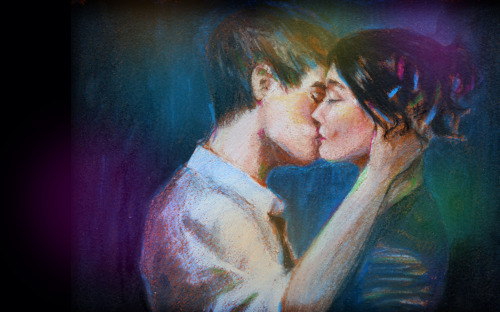
the raven king countdown → day five
OTP
What is love x Baby don’t hurt me
I have very few important photos of Lover and I.
Wait, let me back up.
It’s a bit of a grim thing to realize that if, as a writer, you’re actually throwing yourself properly at a novel, it’s going to eventually be a sort of thesis statement. With every stroke of character development, you’re asking yourself, do I really think that if x happened to a person they might become y as a result? Do I really believe that trigger B might cause action F?
Do I think there’s a difference between friendship love and romantic love? And a possibly more relevant question for this series, do I care?
For the longest time, I had a post-it note stuck to my computer while I was writing the Raven Cycle. My handwriting exhorted me to remember that the worst thing that could happen to the characters was they could stop being friends. The importance and greatness and pain that is friend-love often gets the shaft in fiction, so I wanted a series where friendship was the most important stake.
But there are romance relationships in the series, too, increasingly important ones, and as I wrote this messy pile of passionate friendships, I realized I was going to have to produce a thesis statement in this novel. Did I think that romantic love and friend love were different? And if I did, how did I think they were different? I already knew that the answer wasn’t physical attraction. Physical crushes are not love, and asexual folks have romantic relationships.
What’s the difference, Stiefvater? I asked myself. Think carefully because this is going in writing.
So it turns out that I have very few photos of Lover and I. I have a billion photos of my close friends and I doing all kinds of ridiculous shit and having all sorts of endearing moments. And there are many photos of Lover that I have taken and photos of me that he has taken. But although we are often together, there are few photos of us together, and the ones that we do have are usually during pointless, touristy moments of our lives. The reason for that isn’t a lack of investment, but rather the opposite. In those most essential moments of usness, there is no one else close enough to take a photo of us, and in any case, the importance of the moment wouldn’t show up on camera anyway. How do you take a photo of a conversation in the middle of the night or capture how a ragged sigh fixed everything wrong with an evening? And even if we could get that on film, who would we show such a photo to anyway? We don’t need it for each other. We’ll remember it.
That’s not a full answer, because I don’t have words for why my relationship with Lover is different than my relationship to my friends. It’s intangible, suggested not in the stuff that’s said, but the stuff that doesn’t need to be said. Not in the photos we took, but the ones that we didn’t need to take.
It’s hard to shove a truth you don’t quite have words for into a book — books tend to be made of words — but I did my best. And hopefully as the group begins to pair off and fracture and repair in the final book, it’ll feel true to the reader, too, even if they don’t have words for it, either.
maggie-stiefvater:
the raven king countdown → day six
Most...
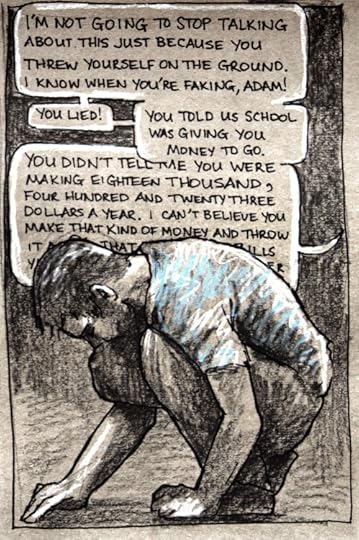
the raven king countdown → day six
Most heartbreaking moment
Such a damaged thing
I think the most heartbreaking Raven Cycle moment is in The Raven King (though it is not the one you think it is), but I actually think this Adam moment in The Dream Thieves comes in close second. He’s already had to endure quite a few heartbreaking events, such as losing his hearing and his family home and stability in quick succession, but the worst moments to write for him were actually not events but thoughts.
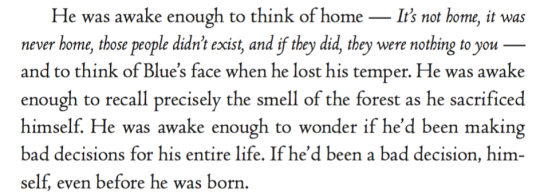
I know too many people stuck in this place: they’ve removed the cause of their trauma, but they haven’t realized that they are still actively traumatized. In DT, Adam academically knows the consequences of long-term child abuse, but he hasn’t yet realized the portability of his abuse. It doesn’t matter that his father isn’t living in the room next to him. He’s living in Adam’s head, and that sort of life — freed from physical reality and set free in a world of damaged thoughts — is lasting and insidious. For Adam to admit that he’s been broken by abuse is a powerful step towards moving on, but in DT, he’s still too far in it to realize that his clinical analysis of his own worthlessness is not clinical at all.
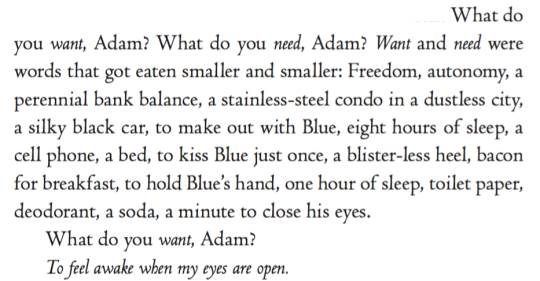
Money, a car, a home that looks nothing like the one he grew up in. Someone to want him. Adam thinks all of these things — any of these things — will make him happy. And it’s true that they’re things that would make his life easier or different. But DT Adam doesn’t realize that he could get every single thing in that list and still not be ok. He can’t work his ass off at Aglionby to magically make himself feel like he’s worth something. He can’t annex the entirety of Virginia to his father’s memory to be free of pain outside the state lines. Being wanted by Blue Sargent or crushed on by Ronan Lynch is not going to make Adam love himself any more.
I admit freely that I don’t really know if these scenes are heartbreaking to anyone else. As a writer, I bring my own baggage, and for me, much of the agony of Adam in this part of his journey is knowing people who have never gotten any further than he does in this part of the series.
Dear Maggie, my mom is a writer and lately her books have been getting bad reviews, mocking the stories or who she is as a person. She's obviously very upset. What do you do when you get bad reviews and know you can't say anything about it?
Dear steepingstars,
I feel for her; the internet has become a more gleefully nasty place in the years since I’ve first gotten published. Internet culture has decided that you can still be a heroic person as you mock or drag someone, so long as you have proven your victim to be a villain of some kind. I know very few villains, but I know a lot of people getting dragged. I won’t lie; it’s a hard place to be a writer in.
That said, I have three pieces of advice — and this isn’t just for your mother or for published authors, this is for any writer or creator. This is the world you’re birthing your stories into; you might as well get the nursery ready.
1) Think of your favorite novel. It has to be one that you’ve read lots of times. One that is basically a vacation home on your shelf. You’ve memorized lines. You know it so well you can open up to just a single chapter in the middle and reread it for the comfort of rereading it, and you don’t have to even read the rest because the story’s already hooked so securely to the coils of your brain.
Now go to Goodreads and find the page for that book. Read its 1 star reviews. They will be terrible. They will be scathing. They will shred it. How do I know? Because every book has terrible 1 star reviews. As you sit there with your curled lip (WHO COULD HATE THIS PERFECT NOVEL), take note of the teachable moments within. Notice how the 1 and 5 stars reviews will sometimes disagree — “the character development is crap!” “the characters are amazingly like real people!” — but also notice how sometimes they will agree. “Chapter 14 was a leisurely dream; I loved it” or “Chapter 14 was pointlessly slow.” It’s important to remember that there is not a single story in the world that everyone will love. You don’t need everyone to love it. You have to write like you’re writing for readers who will love it. You have to write like you’re writing for the readers who want that story alone.
2) If you throw out the extremes — the most searing one stars and the most dazzling five stars — you start to get into the reality. Despite what the reviews say, the odds are very unlikely that you are actually either the worst or best writer to have ever lived.
3) The personal attacks are a hard pill to swallow, particularly when someone shouts something you know isn’t true, but there’s no real point in defending yourself. Often readers come in assuming certain things about you, and it doesn’t really matter what you say or write, they’ll twist it round to make it further evidence of their predetermined thesis. I advise using list item #2 in this case as well. If you throw out the most glowing statements about your person and the most terrible snarled comments about your person, you start to get closer to the reality of who you are. Remember, though, the Internet is not your friend, even when they are friendly. They are also not your enemy, even when they’re terrible. They can’t be, because they don’t really know you. Only you and your inner circle have an inside line on the true colors of your heart.
urs,
Stiefvater
Maggie Stiefvater
- Maggie Stiefvater's profile
- 171417 followers


